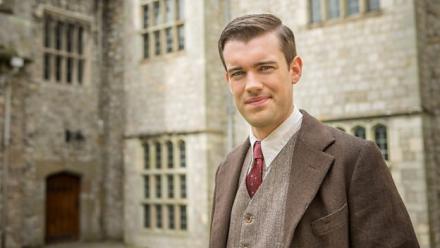
Could you introduce yourself and tell us a bit about your character?
I play Paul Pennyfeather, who is the character at the centre of this mad world. He is expelled from University at the beginning of the story and ends up becoming a teacher, marrying a rich heiress and then goes to prison.
What drew you to this production?
I actually read the book when I was much younger and was a fan of it already, so I was aware of it when the project arrived and was very excited that I'd been asked to be part of it.
It's my dad's favourite book, I think because it has similarities to his life, not the prison bit, the teaching in a tiny mad little public school, which is what he did when he left school. There's quite a lot of pressure for me to not mess it up because it is his favourite book.
You and David (Suchet) knew each other already didn’t you?
Yes, I was David's runner. That was one of my first jobs actually; get him tea and coffee. So now it's quite nice that we're working alongside each other and we're kind of on a level playing field. Although, sometimes I lapse into my old ways and offer him tea and coffee again; he never makes me go and get it for him, which is nice, because I would.
Have you enjoyed working with any other actor or character in particular?
I loved doing scenes with Stephen Graham, he is very scary and I think revels in how terrifying he can be. He's a very physical performer; he liked punching me and slapping me and didn’t ever tell me that he was going to do it in the scene.
My fear in the scenes with Philbrick is very real and Stephen deliberately, I think, made a decision to make sure that I was very unnerved in scenes with him.
Did you have to update the character’s behaviour for a modern audience?
Yes, we tried to update the behaviours of our characters I think a little bit, and make sure that it was as accessible as it could be, especially with things like speech patterns, and you don't want to start doing some weird voice just because it's period.
I had to change various things, physically, to make him period, which was quite distressing, including revealing my little baby face.
It's quite an unusual story, with Pennyfeather being what you might call a passive hero, reacting to events rather than pushing things forward himself. Was that a particular challenge in any way, or a blessing?
Paul is quite a reactive character, and sometimes he's quite passive, but I think it's important that he's a little bit more naturalistic and all the people around him are monsters. He has to be the anchor for the audience for all the madness.
You mentioned all the monsters around him; what do you think of his morality and his attitude towards these people and does that change him through the course of the story?
I think at the beginning Paul's quite a naïve character, and he meets all these people and he's kind of seduced by them and doesn't necessarily realise how monstrous they are. As the story progresses he becomes a bit more mature and a little bit more aware and, by the end of it, I think he's a much better judge of character, and a lot more wary of people.
He ends up in the same position that he started. What message do you think that sends in the story?
He does end up in the same place, but I think it's important to show that he's a character that has developed. Even though he's back where he started, he's a completely different person, and that's really exciting, to be playing a character that does go on a journey and matures and develops and grows up.
James Wood’s adaptation has stayed quite true to the original text, where sometimes you need to speed up a text for TV. Was it seamless?
The story zips along, and Paul wanders around from world to world, and I think that really helps for a modern TV adaptation. A lot of the dialogue is very cutting, very biting, and the humour is quite modern, so that really helps.
It's a satire and a lot of the subjects that it is satirising are still very relevant today. It opens with the Bollinger Club, who I think are very much part of the public consciousness now. Everything from public school system, the church, the prison system and things like that, they all get mentioned and they all still seem like relevant targets.
It's kind of depressing how satire in 1928 is still very relevant and pertinent today, I think that says quite a lot about our country and how little has changed.
Decline And Fall premieres on BBC One on Friday 31st March at 9pm
Interview supplied by BBC. Picture is of Jack Whitehall in character as Paul Pennyfeather, not how he dresses when not doing stand-up.



